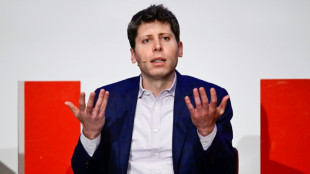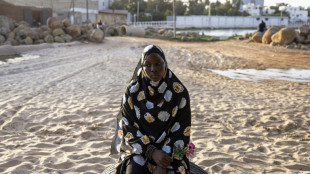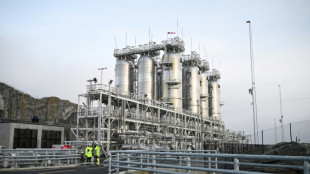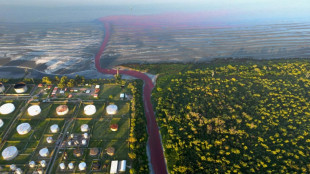-
 Sumo returns to Paris and turns heads
Sumo returns to Paris and turns heads
-
NFL will play first regular-season game in Ireland in 2025

-
 Trump hosts Japan PM, threatens tariffs
Trump hosts Japan PM, threatens tariffs
-
World MotoGP champion Martin undergoes surgery on hand injury

-
 Mum's the word as Bencic stuns Rybakina to reach Abu Dhabi final
Mum's the word as Bencic stuns Rybakina to reach Abu Dhabi final
-
Macron says AI should not be 'Wild West'

-
 US stocks slide as inflation expectations jump
US stocks slide as inflation expectations jump
-
Trump demands US aid agency closure despite tumult

-
 Dupont glad England have barred Toulouse team-mate Willis from 'Le Crunch'
Dupont glad England have barred Toulouse team-mate Willis from 'Le Crunch'
-
DR Congo conflict advances as UN warns of regional escalation

-
 OpenAI's Altman warns EU regulation may hold Europe back
OpenAI's Altman warns EU regulation may hold Europe back
-
Flowers in the sand: families mourn Senegal migrants lost at sea

-
 India PM Modi to meet Trump in US visit next week: foreign ministry
India PM Modi to meet Trump in US visit next week: foreign ministry
-
2 dead after small plane crashes on busy Sao Paulo street, hits bus

-
 Venezuela brands Rubio a 'thief' over US jet seizure
Venezuela brands Rubio a 'thief' over US jet seizure
-
Trump slams paper straws, vows 'back to plastic'

-
 Tsitsipas falls to giant-killer Bellucci in Rotterdam
Tsitsipas falls to giant-killer Bellucci in Rotterdam
-
Pakistan opens renovated Champions Trophy stadium

-
 Italy Church abuse group highlights toll on families
Italy Church abuse group highlights toll on families
-
US sees slower January job growth, below expectations

-
 Krueger downs Noskova to reach Abu Dhabi final
Krueger downs Noskova to reach Abu Dhabi final
-
US stocks rise as investors digest US jobs report

-
 NBA in touch with Decathlon over China forced labour accusations
NBA in touch with Decathlon over China forced labour accusations
-
Reid, the father figure behind the Chiefs dynasty

-
 UK MPs warn billions spent on carbon capture may hit bills
UK MPs warn billions spent on carbon capture may hit bills
-
Trump's trade tempest: Week one

-
 Top cycling teams pull out of French race over safety issues
Top cycling teams pull out of French race over safety issues
-
Man City women's star Shaw misses game due to online abuse

-
 Russia says captured key mining town of Toretsk in east Ukraine
Russia says captured key mining town of Toretsk in east Ukraine
-
US envoy says Hezbollah 'defeated', must not be in Lebanon government

-
 US job growth misses expectations in January
US job growth misses expectations in January
-
Hamas and Israel set for next Gaza truce exchange

-
 Xi attends opening of Asian Winter Games in China's icy Harbin
Xi attends opening of Asian Winter Games in China's icy Harbin
-
Greek PM insists no danger from Santorini quake swarm

-
 2 dead after small plane crashes in Sao Paulo street, hits bus
2 dead after small plane crashes in Sao Paulo street, hits bus
-
Campaigning ends as violence-weary Ecuadorans eye Sunday vote

-
 London's Grenfell Tower to be taken down after deadly 2017 fire
London's Grenfell Tower to be taken down after deadly 2017 fire
-
England captain Itoje turned down French club move to fulfil Test dreams

-
 'Perfect' Odermatt delivers super-G masterclass for third world gold
'Perfect' Odermatt delivers super-G masterclass for third world gold
-
Slot keen to make Liverpool's 'good' season a 'great' one

-
 Postecoglou braced for Spurs 'pile-on' after League Cup collapse
Postecoglou braced for Spurs 'pile-on' after League Cup collapse
-
Putin hails Russia's strong 2024 economic growth

-
 England's El-Abd always knew France star Dupont would go far
England's El-Abd always knew France star Dupont would go far
-
Smith and Carey tons put Australia into lead in second Sri Lanka Test

-
 Odermatt delivers super-G masterclass for third world gold
Odermatt delivers super-G masterclass for third world gold
-
Disgraced 'Emilia Perez' star vows to remain 'silent'

-
 A stream turns blood red in Argentina, residents blame pollution
A stream turns blood red in Argentina, residents blame pollution
-
Stock markets, dollar mixed before key US jobs data

-
 'Existential threat': What next for the ICC after US sanctions?
'Existential threat': What next for the ICC after US sanctions?
-
Papadakis and Hubbell take same-sex ice dancing to new level

| RIO | -0.01% | 62.185 | $ | |
| CMSC | -0.34% | 23.36 | $ | |
| BCC | -2.35% | 122.235 | $ | |
| JRI | -0.57% | 12.757 | $ | |
| SCS | -2.52% | 11.295 | $ | |
| CMSD | -0.44% | 23.725 | $ | |
| BTI | 0.05% | 41.64 | $ | |
| BCE | -5.05% | 22.39 | $ | |
| RBGPF | 0.77% | 66.51 | $ | |
| RYCEF | -1.07% | 7.45 | $ | |
| RELX | -0.42% | 50.19 | $ | |
| AZN | -0.03% | 72.34 | $ | |
| VOD | 1.11% | 8.535 | $ | |
| NGG | 0.21% | 61.8 | $ | |
| GSK | -0.51% | 36.195 | $ | |
| BP | 1.25% | 32.365 | $ |
UN rights council launches probe of abuses in east DRC
The UN Human Rights Council launched an investigation Friday into alleged violations and abuses committed in the deadly clashes gripping the eastern Democratic Republic of Congo.
The DR Congo itself requested the urgent meeting of the UN's top rights body to jolt the international community into action over the escalating fighting by Rwanda-backed armed group M23 in the North and South Kivu provinces.
Last week, M23 fighters and Rwandan troops seized Goma, the provincial capital of North Kivu -- a mineral-rich region that has been blighted by war for over three decades -- and are now pushing into South Kivu.
The Human Rights Council's 47 member countries adopted by consensus a resolution ordering the probe -- and demanding that M23 pull out of occupied areas and the Rwandan forces withdraw from DRC territory.
UN human rights chief Volker Turk warned of worse to come if the violence spreads throughout the wider region.
Eastern DRC has deposits of gold and other valuable minerals including coltan, a metallic ore that is vital in making phones and laptops.
"The population in the eastern DRC is suffering terribly, while many of the products we consume or use, such as mobile phones, are created using minerals from the east of the country. We are all implicated," Turk told the council.
"If nothing is done, the worst may be yet to come, for the people of the eastern DRC, but also beyond the country's borders," he said.
"The risk of violence escalating throughout the sub-region has never been higher."
Turk insisted there could be no military solution to the conflict, which has displaced more than 500,000 people so far this year.
- 'Indiscriminate bombing' -
M23's lightning offensive against Goma was a major escalation after more than three years of fighting.
Turk said that since January 26, nearly 3,000 people have been killed and 2,880 injured, adding that the real figures were likely far higher.
Congolese communications minister Patrick Muyaya said the adopted resolution was a sign of global solidarity with people "now living under Rwandan occupation".
"The world has understood where the evil comes from and the need to work so that evil does not happen again," he told journalists.
He said it showed the world wanted the situation resolved quickly, and also for "the executioners to be known and punished".
Rwanda's ambassador James Ngango told the council his country was not responsible for the instability but claimed evidence had emerged of an "imminent large-scale attack against Rwanda".
He claimed Kinshasa had stockpiled weapons near Rwanda's border, including rockets, drones, heavy artillery which were "pointed directly at Rwanda", which would "not wait for the threat to materialise".
Ngango said Rwanda was committed to a political solution to the conflict and said it was a "widely propagated lie that mineral resources are the cause".
- 'International crimes' -
Friday's resolution called for strict measures to halt the "unlawful exploitation of natural resources" in the area.
It "strongly condemns the military and logistical support provided by the Rwanda Defence Force" to M23 and demands that they "immediately halt human rights violations".
It also demanded fighters "immediately cease all hostile actions in and withdraw from the occupied areas", and urged them to ensure unhindered humanitarian access.
The resolution called for a "fact-finding mission on the serious human rights violations and abuses and serious violations of international humanitarian law" in Kivu.
The investigators should collect evidence of abuses for use in future court cases and seek to identify those responsible, the text said.
A commission of inquiry -- the highest investigation in the rights council's armoury -- will carry on the work after the fact-finding mission reports its findings in September-October, it said.
F.Müller--BTB
